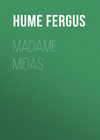Czytaj książkę: «A Woman's Burden: A Novel», strona 9
CHAPTER XIV.
ON CHRISTMAS NIGHT
Christmas Day dawned – the day of peace and goodwill, of renewed friendships and Christian forgiveness. Mrs. Darrow was very careful to observe the day as behoved a righteous and gentle spirit. Compelled by the weightiest of reasons to keep silence, she restrained the horrid words which were on the tip of her tongue, and at breakfast addressed Miriam with something like a show of kindness. The girl looked terribly pale and ill; but was, as always, complete mistress of herself. She had gone straight to bed on her return from the church, and had of course no idea that Mrs. Darrow had followed her; she did not even know she had been out. But the change in Mrs. Darrow's demeanour in nowise imposed on her. She accepted it gravely and quietly for what it was worth, and welcomed it only as tending to lessen the chances of friction for the time being.
"I have been thinking over things, Miss Crane, and I have come to the conclusion that I owe you an apology," said the widow, after having passed the customary compliments of the season. "I lost my temper the other day when I spoke of your leaving. But my wretched nerves – mother's side, you know – must be my excuse. You are too pleasant a companion and too valuable a teacher to my beloved child for me to lose you. You must please forget the words I said, and accept my sincere apology for them. Miss Crane, I ask you, will you stay?"
This was a very neat little speech, and glibly enough expressed, but Miriam at once detected its falsity. Still, she accepted Mrs. Darrow's apology, and agreed to remain.
"I'm sure I like you very much," said the widow effusively, "and I think someone else does too – someone who will be at the Manor House dinner to-night. Need I say that John is in my mind?"
"Major Dundas and I are very good friends," replied Miriam gravely.
"Yes, indeed; and some day you may be more than friends!"
"I think not, Mrs. Darrow."
"Well, we shall see. At all events, we are all going to enjoy ourselves to-night. Besides ourselves, Dr. and Mrs. Marsh are to be there, and Dicky by special desire – fancy the dear boy at a grown-up dinner-party! Uncle Barton's Christmas dinners are always excellent. I must say he does it very well. He seems to love to gather us all around him on this day, dear man," concluded Mrs. Darrow sentimentally.
Miriam had to restrain a smile.
"Really! You surprise me; but of course I have never yet seen Mr. Barton at Christmas time."
"Oh, believe me, there is much good in Uncle Barton, although he is rough. He does not understand me, it is true, but there, I am a problem even to myself – I am one of those complex natures. Dear! how they suffer! Nor does he like everyone. There is Mrs. Parsley, for instance; I know he hates her, and I'm sure I don't wonder. By the way, you saw her last night – at least," added the widow pointedly, "you went out to see her." She looked directly at Miriam, who bore her scrutiny without flinching.
"Yes; I saw Mrs. Parsley, and remained with her for some time. I suppose you had gone to bed when I returned. I was careful not to disturb you."
"No; I was half asleep in the drawing-room," lied Mrs. Darrow glibly, "dozing over a stupid novel. I hope you had a satisfactory interview."
"Very, thank you," replied Miriam, and there the matter dropped.
At six o'clock the Squire sent his carriage, the coachman explaining that he came thus early, as he had to go on to fetch Dr. and Mrs. Marsh and their daughter. At this Mrs. Darrow grumbled loudly, for it meant she had to hurry over her toilet, and Mrs. Darrow's toilet was one of those things which did not do with hurrying. However, at length it was achieved, and the good lady, excited and flushed, allowed herself to be conducted to the carriage.
On arrival at the Manor House they found Major Dundas and Gerald Arkel in the drawing-room. The Squire was not there to receive them, but almost immediately after they had entered, a message was brought to Miriam that he wished to speak to her alone in the library. Mrs. Darrow was alarmed. Surely the man was not going to chose this opportunity for betraying her eavesdropping? Then she reflected that even if he did she had it in her power to make it equally unpleasant for Miriam. Thus comforted, she fell to chatting with Major Dundas.
In the library the Squire received Miriam. He looked particularly frail and old, she thought. Bidding her sit by the writing-table, he recounted to her all that had passed on the previous night between himself and his niece. But Miriam expressed little surprise.
"I knew she hated me," she said, "and would gladly ruin me if she could. Why, goodness only knows. I am not aware of ever having done anything to offend her."
"I know," snapped Barton. "You have committed the greatest offence you could commit in her eyes – that of being beautiful and young. That is more than enough to secure the enmity of the perambulating mass of vanity which we know by the name of Julia Darrow. But let us leave her for the present. She will keep – unfortunately. What about Jabez? Is there any truth in what she told me?"
"Yes; it is quite true he came here last night – to get money from me. He is going to America; indeed, he may have started by this time. I feel that I shall never see him again."
"That oughtn't to trouble you."
"Perhaps not – but bad and selfish as Jabez has been to me, I can't help feeling it. What I have done for him I did freely; I expected no gratitude."
"And you didn't get it. Well, that's the way of the world. But tell me, Miriam, what is he like, this worthy?"
"You couldn't call him handsome. He is tall and very spare. His eyes are blue, and he has a freckled complexion. His hair is red."
"No, it doesn't sound attractive. However, he's out of the way now, and I for one am glad; though I don't suppose he would have tried any tricks on with me."
"I'm sure he meant no harm to you. Of course, if you had interfered with him, I can't say what might have happened. He has always had the most ungovernable temper. But I have never known him do anything right down wicked in cold blood."
"Well, so much the better. I've enough enemies and to spare as it is. I shouldn't have interfered with him, even if he hadn't gone. I utilised him, as you know, merely to control you."
"All that is past and done with now. There is no possibility of my carrying out your scheme. I want you to let me go back to London, Mr. Barton."
"And there, what will you do?"
"God knows! Begin all over again, I suppose."
"You are absolutely without means!"
"Yes, that is true. I gave him all I had."
"Like you," growled Barton, going to his desk. "You must take this, Miriam" – he handed her a bank-note – "for the present. And when you are in London you must stay at the Pitt Hotel. I have told Mrs. Perks to look after you, and to leave the rest to me."
"I really am to go, then?"
"It is your own wish, isn't it? I can see there is no hope for my plans about Gerald. He and Hilda will make their way to the devil together, in a very short space of time. Facile est, etc."
"Then you still intend to leave your money to Gerald?"
"I have done so." He took a legal-looking document from the still open drawer. "Three days ago I sent for my lawyers in London to come here, and I executed this will. By it the whole of my property goes to Gerald, excepting three hundred a year to Julia, and the same amount yearly to yourself."
"To me!" exclaimed Miriam in surprise. "Mr. Barton, why should you leave money to me?"
"For one reason, because you are the only decent woman I have ever met – save one. For another, because in spite of what I told you the other night you had some pity for me."
"God knows I pity you!" cried Miriam with emotion. "I can imagine how awful it must have been for you to battle continually against what is born in you. You have resisted the devil and he has fled."
"I have resisted him these many years," said Barton moodily, "but he has not fled; he is as strong within me as ever. God, Who created me thus, alone knows how I have fought against my overwhelming desire – the desire for the blood of my fellow-men. So far, by His aid, I have succeeded in my fight, and my daily and hourly prayer is that the end may even now not be far off."
"You have done well – it is terrible for you. Indeed, you have my pity – I would do anything to help you, Mr. Barton. But you must not, please, leave me this money. For one thing, Mrs. Darrow – "
"I have foreseen all that, and have, I think, effectually provided against any molestation from her. I have seen all along how she has plotted against you. You need fear nothing from her. While I live, Miriam, I shall look after you; when I die, you will have money of your own."
"I had rather a thousand times you did not mention me. There is Major Dundas – he would make good use of your wealth. But Gerald – poor weak Gerald – "
"My mind is made up, Miriam. This will supplants the will in favour of Dundas, which is at my lawyers' in London. As soon as I send them this in its stead, the old will is to be destroyed. With the new year I intend publicly to proclaim Gerald my heir. Now come along to dinner – that is what I wanted to say to you."
She saw that all protestation was useless, supplication futile. Without a word she took his arm and returned to the drawing-room, there to find that Dr. and Mrs. Marsh had arrived meanwhile with Hilda, who was looking her best. Her mother was dressed untidily as ever, but there was also evident about her an air aggressive as it was unusual of splendour, significant of a desperate attempt on her part to make herself presentable. Dr. Marsh, in the immediate expectation of an uncommonly good dinner, saluted the Squire with positive unction, and an immediate adjournment to the dining-room met with his most unqualified approval.
To attempt to single out this Christmas dinner in particular from Christmas dinners in general would be a task as superfluous as unprofitable. Suffice it to say that Dr. Marsh's anticipations were more than realised, and that when the ladies left the room he was in a state of mind bordering upon the transcendental.
Barton, ever the most unconventional if not the most genial of hosts, took refuge in the seclusion of his library, and remained there for the rest of the evening. Chatter worried him, and that was the one spot in the world where he could depend upon enjoying complete immunity from it. But he had reckoned without his guest, for on this occasion Mrs. Darrow had decided he should come out of his shell, and was now casting about in her mind for some method of accomplishing her aim without risk to herself. It was rather more than she cared to venture upon in person. An expression came upon her face which seemed to intimate that she had an inspiration. Dicky! – yes, Dicky should go and ask his uncle to join what she termed the "circle." So away the boy sped on his errand of mercilessness, when of a truth he should have been in bed and fast asleep.
"If anyone can persuade uncle to play a game of forfeits, Dicky can," piped Mrs. Darrow, when the door had closed behind the little fellow; "he is such a dear, nobody can resist him – he has my own nature," this last in all seriousness.
"And your high spirits, Julia," added the Major.
"Yes, I never seem to lose them, though it's wonderful I don't in the face of my many trials. Miss Crane, you will sing to us till Mr. Barton comes, won't you?"
Miriam assented, with the result that song followed song, and the time flew by unheeded. As the clock struck eleven she rose quickly.
"Whatever has become of Dicky?" she said; "he can't be with Mr. Barton all this time. I must go and look for him."
She left the room hastily.
"Such a good creature!" exclaimed Mrs. Darrow. "If she only knew her place she would be quite perfect."
"I think Miss Crane is perfect," retorted the Major with some asperity.
"So say I," echoed Gerald.
At that moment Miriam appeared at the door, pale, terrified, and scarcely able to articulate. Mrs. Darrow saw that something was wrong, and shrieked,
"My child! my child! – my precious Dicky! Is he ill?"
Miriam shook her head, and beckoned to Marsh.
"Come, doctor, quick – Mr. Barton!" she gasped, and everyone made a rush for the door.
On entering the library they found the window wide open, and poor little Dicky lying prone upon the floor. In the chair before his desk sat Barton, with his head embedded in his outstretched arms. With another shriek Mrs. Darrow fell on her knees beside her son. Dr. Marsh walked swiftly up to Barton and raised his head. He stepped back a pace in horror.
"Dead!" he said. "The man is dead!"
Again they raised the lifeless head. A black line was distinctly visible round the throat.
"Strangled!" exclaimed the doctor. "He has been murdered!"
CHAPTER XV.
A NINE DAYS' WONDER
The murder of Barton made a considerable stir not only in the parish of Lesser Thorpe but throughout the county. From Southampton came the police to take charge of the body and the case; to discover, if possible, the murderer, and close the black chapter of the Squire's life. Barton had evidently been strangled about ten o'clock. Upon this Dr. Marsh insisted; the child had come into the library at half-past and had taken a fit from fright. Half an hour later they had both been found. The window was open, there were confused footmarks on the terrace, and the assassin – whoever he was – had had ample time in which to effect his escape. On such evidence did the police begin to build up their case. Needless to say that they were completely unsuccessful.
But the strangest part of the whole strange business was, that the will in favour of Gerald had disappeared. And upon this disappearance Mrs. Darrow, if no one else, was inclined to base the motive for the crime. Her mouth was now no longer closed – the only person who could close it was dead – and she was not long in venting her spite on Miriam. Communication with Barton's lawyers had elicited the fact that a new will had been executed by their client a day or two before his death. The old will in favour of Dundas still remained in their office. But although search was made everywhere for the more recent document, it could not be found. No one at the Manor House had seen it, Miriam alone having done so, but she thought it best to keep her own counsel; and indeed she was only too pleased to think that Gerald would now be compelled to earn his own living.
As soon as the will leaving the property to Major Dundas was read, and Mrs. Darrow learned that her three hundred a year was secure for life, she sent for Miriam. The moment of her triumph and revenge had arrived, and she determined to make the most of it. Throned in an arm-chair she threw off all disguise, and received her governess like the culprit she held her to be.
"You wish to see me, Mrs. Darrow," said Miriam quietly. She knew pretty well what was coming.
"Yes, Miss Crane, I sent for you to request that you leave my house to-morrow."
"I am quite willing to go," replied Miriam quietly; "indeed, if you wish it, I can go to-day."
"You will go when I please, and not before," cried the widow quivering with petty spite, for Miriam's impassiveness exasperated her beyond endurance. "And be good enough to remember that while you are here you are my servant. You forget yourself. Because Mr. Barton engaged you is no excuse for the insolence to which you treat me. I am of course not liable for your money."
"In that case, Mrs. Darrow, I must apply to Major Dundas, as Mr. Barton's heir."
"Oh, I daresay you will," sneered Mrs. Darrow, "but there is no chance there; I know your tricks and your sly deceit. You think you'll catch him, but you shan't, not if I can help it. The county gaol – not the Manor House – is the proper place for young women of your stamp!"
"If you have nothing more to say I will go," said Miriam, keeping her temper wonderfully well under the woman's insults.
"But I have more to say. Don't be insolent, I tell you. I hold you in the hollow of my hand."
"What do you mean?" asked Miriam imperiously.
"Mean! you know well enough what I mean. You know you were in love with Gerald Arkel and tried your best to marry him; and as Hilda Marsh beat you and upset your little plans, you thought you would steal the will so that her husband should not get the property. Yes you did – and you are Mr. Barton's murderer – that's what I mean!"
"You must be mad!" gasped Miriam, thunder-struck. "I gave my evidence at the inquest as everyone else did; and the jury brought in a verdict that Mr. Barton had been murdered by some person unknown. You know what you say is a dastardly falsehood. I was in the drawing-room singing when Mr. Barton met his death; and Dicky saw the body half an hour before I did. I found the poor child in a fit, and rushed back to call you all. How dare you make such accusations against me – dare to say that I killed one of the few men who have been kind to me?"
"Oh, I daresay there are plenty of men who have been kind to you," scoffed Mrs. Darrow venomously. "We know all about that, Miss Crane – if Crane is your name, which I very much doubt. But I don't want your infamous London life dragged up here, thank you!"
"Mrs. Darrow," cried Miriam in a cold fury, "if you dare to slander me in this way I will bring you into Court to prove your charges."
"Do – do. It's what I wish. I have held my tongue so long for my dead uncle's sake, but no longer now, my young lady – no, I go straight to the inspector of police."
"There you will have to give some proof of what you say!"
"I can do so – in one word – Jabez!"
Miriam reeled, deadly white, and but for the support of a chair she caught she would have fallen. The blow was so unexpected, so suddenly delivered, that she knew not how to parry it.
"Jabez," she murmured, pale to the lips; "Jabez!"
"Yes, Jabez," cried Mrs. Darrow, following up her advantage. "Fie on you, you horrible woman! meeting low creatures behind the church and plotting murder!"
"Ah! you followed. Yes, Mr. Barton told me you did."
"Yes, I did follow you in the interests of purity. And it is well I did, for I found out what you are, a low, wicked – "
Miriam held up her hand and stepped forward so suddenly that Mrs. Darrow stopped short.
She saw how perilous was her position; and she nerved herself to cope with it.
"Silence!" she cried peremptorily. "You shall not abuse me in this way. If you have any definite charge to make, state it, and the evidence on which you have it."
"I accuse your lover, Jabez, of killing my poor uncle to steal that will and ruin Gerald Arkel, and I accuse you of aiding and abetting him."
"That is at least concise," said Miriam bitterly; "and your evidence?"
"I heard Jabez say that he would 'knife' Mr. Barton if he interfered with him."
"Quite so; well, as Mr. Barton did not interfere with Jabez, evidently the motive was wanting. As to my having been a party to anything calculated to harm either Mr. Arkel or Mr. Barton, that is a foul lie, such as only yourself could invent."
Mrs. Darrow rose and drew her shawl round her.
"We shall see what the inspector says," she said savagely. "I shall tell him all I overheard, and formally charge you."
"There is no need for you to do that," replied Miriam. "I shall go to the inspector myself and tell him everything."
"You dare not," cried the widow.
"Not only dare, but will! I leave your house at once, and apply to Major Dundas for the salary due to me."
"Yes, and take to your heels, no doubt – but I'll see you don't get very far, my lady."
"As far as Southampton, whither Major Dundas will, I have no doubt, accompany me. There, fortunately, I shall be able to put it out of your power to harm me. I will not say what I think of you further than to pity from the bottom of my heart the poor dear little child who has the misfortune to call you mother." Then, without another word, Miriam left the room.
Upstairs she packed her box, dressed herself, and went off to bid good-bye to Dicky. The child's nervous system had received a severe shock at the sight of the dead man's body. Since the fatal night they had been obliged to keep him in bed. Now, although more composed, he was still acutely nervous. When Miriam entered the nursery he started up with a slight cry. She took him in her arms, and could feel that he was trembling.
"Hush, Dicky dear!" she said, kissing him, "I have come to say good-bye to you just for a little while."
"Oh!" the boy clung to her and wept. "You are not going away, Miss Crane?"
"Yes, dear – I must." She had not the heart to tell him the whole truth. "But I shall come back and see you again very soon. I am only going up to London; and while I am away Dicky is going to be a brave boy, isn't he?"
"I promise – I promise; but I was so afraid when I saw Uncle Barton like that."
"Yes, dear, I know. But poor Uncle Barton is very happy now; you mustn't think any more about him. Tell me, Dicky, do you remember if the library window was open when you went in to see him?"
"Yes, wide open, Miss Crane." Dicky shuddered. "And when I touched Uncle Barton he fell on one side just like a doll. And when I saw his face I was so afraid, and I felt so giddy and I fell right down – "
"Did you see anyone, Dicky?"
"Oh, no, I saw no one."
"Did you hear anything?"
"Oh yes, the wind. I was so afraid of it. And I was so afraid of Uncle Barton too – he was so white, and he couldn't speak, and his mouth was open, and his eyes looked funny. Oh, Miss Crane, dead people are horrid – I can't bear them!"
"Yes, dear; we won't talk any more about it. Look, here is my gold chain, and while I am away I want you to wear it for my sake – will you?"
Dicky's fancy was caught at once.
"Oh, thank you; thank you, Miss Crane," he said, kissing her. "Now I will be your knight. The Knight of the Golden Chain. Oh, I shall always wear it, and I shall never forget you, Miss Crane, never! Must you go?"
"Yes, dear; I must go now. But some day I'll see my Dicky again. Perhaps he'll be a big boy then, and be going to school. You'll think of me even then, dear, won't you? – and of the walks and the talks we used to have? Oh, Dicky, it is so hard for me to leave you! You won't forget me? You must never forget your Miriam!" She pressed the boy's face to her own and let the tears run freely. Then with one last effort she dragged herself from him, and passed quickly out of the room.
She went straight to the village inn and ordered a fly to call and take her to the station in an hour. Then she walked up to the Manor House, and inquired for Major Dundas. He was in, and saw her at once. Indeed, so marked was the eagerness of his greeting that Miriam instinctively became more reserved.
"Major Dundas," she said, coming to the point at once, "I am indeed sorry to trouble you, but I thought it only right to come straight to you and tell you how I am placed. Mrs. Darrow has dismissed me. That of itself is nothing; but on the plea that she did not engage me, she has refused to pay the salary due, so I – "
"My dear Miss Crane," interrupted the Major, "you astonish me. Surely Mrs. Darrow – "
"Mrs. Darrow hates me," said Miriam bitterly. "In that you have the explanation of everything. She is only gratifying her spite by turning me out of her house. Not, as I say, that I mind that; but I felt sure in the circumstances you would rather I came to you."
"Of course; you did perfectly right. I shall certainly remonstrate with Mrs. Darrow about this. Let me see, your salary is – "
"Fifty pounds a year," said Miriam coldly, "and there are six months due to me."
Something in her tone prevented the Major speaking further. In silence he sat down to write a cheque, and in silence he handed it to her. She put it in her purse.
"I should like to write you a receipt for this, Major Dundas, if you don't mind."
"My dear Miss Crane, there is not the least necessity."
"Oh, thanks, I think I should prefer to be quite business-like. And perhaps you will show this to Mrs. Darrow." She sat down to the table, and producing a stamp from her purse, affixed it to her acknowledgment of the money. "There," she said, handing it to him, "I think that is sufficient. And now, before I go, there is something else I must speak to you about. When I leave here, I am going straight to the Police Station at Southampton to see the inspector."
"In Heaven's name what for!" exclaimed the perplexed Major.
"Because Mrs. Darrow accuses me of having aided and abetted someone to murder Mr. Barton and steal his will."
"Mrs. Darrow has dared to say that? She is mad!"
"No, hardly mad – malicious," replied Miriam with a faint smile. "But you will hear all she has got to say very shortly. She is sure to come to you with it."
"But I can't understand how such an idea could enter her head. It is monstrous!"
"Let me tell you something," said Miriam. "Not long ago a young man – who for the present must be nameless, save to tell you he is known as Jabez – came down from London to see me here. His object was to obtain from me money to enable him to go to America. This young man and I were brought up together, and I was devoted to him. Years after we met in London. I was in terribly poor circumstances, and he – well, I must confess it, he had reached the lowest depths of dissipation and despair. I was sorry for him even so, and I helped him in the only small way I could. Whenever I had the money to give him he had it. Ever since he has always looked to me for help. He knew I was here and comfortably placed, and he insisted upon coming down to see me. Very much against my will I met him by appointment one evening – it was Christmas Eve – in the churchyard. Mrs. Darrow followed me and overheard my conversation with him. It is upon what she says she heard that she bases this charge. It is of course a very serious charge, and because of this clandestine meeting I feel more strongly impelled than I might otherwise do (seeing the sort of woman Mrs. Darrow is, and is known to be) to take immediate action to clear myself."
"But the facts! my dear Miss Crane – I don't see how – Oh, the whole thing is too ridiculous for words. Now come, you really must leave this to me. I will see Julia at once. This is going a little too far. Believe me, your character will be quite safe in my keeping. I – "
"Yes, yes, I know, Major. You are more than good. But I feel it is a matter in which I should act for myself. I shall go to Southampton and forestall Mrs. Darrow."
"But you will let me know where you are – we shall meet again soon?"
"That I cannot say. You see from Southampton I shall go straight to London. It is very unlikely that we shall meet."
"But, Miss Crane, you must not take yourself away like this. Don't, I beg of you. It is not quite fair on – I mean, at least you will tell me where I may find you in London? Believe me, I – "
"After Mrs. Darrow has said to you all she has to say about me, you may not be so anxious to resume our friendship, Major. Indeed, I sadly fear, quite the contrary."
"Miss Crane! You are unjust – how unjust you do not know. I – "
"Oh, I admit, you have been all kindness to me. But – However, there is my address; come and see me if you will."
She handed him a card upon which were written her name and address. The address was the Pitt Hotel, Craven Street.




















